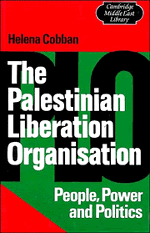Book contents
- Frontmatter
- Contents
- List of illustrations
- Preface
- Abbreviations
- Map 1 Palestine and the surrounding areas
- Introduction
- Part I History of the PLO mainstream
- Part II Internal relations
- PART III External relations
- Conclusions
- 11 The irresistible force and the immovable object
- Appendixes
- Notes
- References and select bibliography
11 - The irresistible force and the immovable object
Published online by Cambridge University Press: 26 January 2010
- Frontmatter
- Contents
- List of illustrations
- Preface
- Abbreviations
- Map 1 Palestine and the surrounding areas
- Introduction
- Part I History of the PLO mainstream
- Part II Internal relations
- PART III External relations
- Conclusions
- 11 The irresistible force and the immovable object
- Appendixes
- Notes
- References and select bibliography
Summary
If, in the late 70s or the early 80s, you were to ask any Fateh leader – or come to that, any member of any other Palestinian organisation, or practically any Palestinian at all – what the resistance movement had achieved after two decades of struggle, the first answer would be to the effect that the resistance movement had re-established the Palestinian identity. ‘In the 50s,’ Yasser Arafat recalled in 1979, ‘John Foster Dulles used to say that the new generation of Palestinians would not even know Palestine. But they did! The group that made the [March 1978] operation against Israel were nearly all of them born outside Palestine, but they were prepared to die for it.’ ‘Palestine,’ said Khaled al-Hassan, ‘had been eliminated from the books and maps; the Palestinian people had been eliminated. The problem was called the Arab-Israeli problem: it was a border problem between states, not a question of a people whose rights had been infringed. Now there is a Palestinian people which is recognised – there is strong recognition everywhere except the United States and Israel. This was our first achievement.' Indeed, by the early 80s, not only was there a worldwide recognition that ‘the Palestinian question’ as such would have to be addressed, but also, inside the many different Palestinian communities themselves, both inside and outside historic Palestine, the people's identification with their own Palestinian-ness had become far deeper than – though still not at odds with*- their self-identification as Arabs, Muslims or Christians.
The present-day Palestinian movement's assertion of Palestinian-ness had, at the beginning, to be made as against the existing claims of both the Israelis and the Arab states.
- Type
- Chapter
- Information
- The Palestinian Liberation OrganisationPeople, Power and Politics, pp. 245 - 262Publisher: Cambridge University PressPrint publication year: 1984



